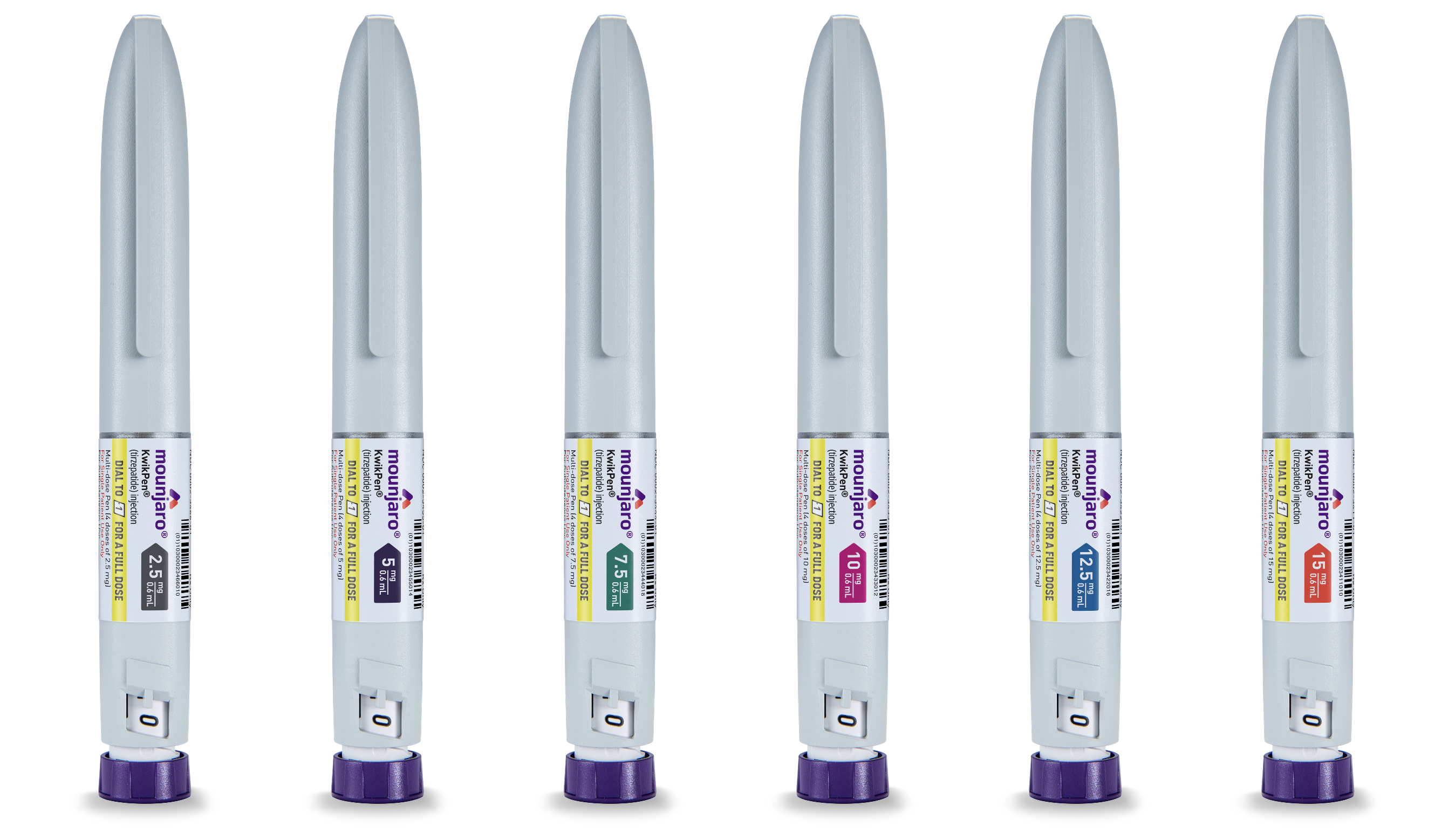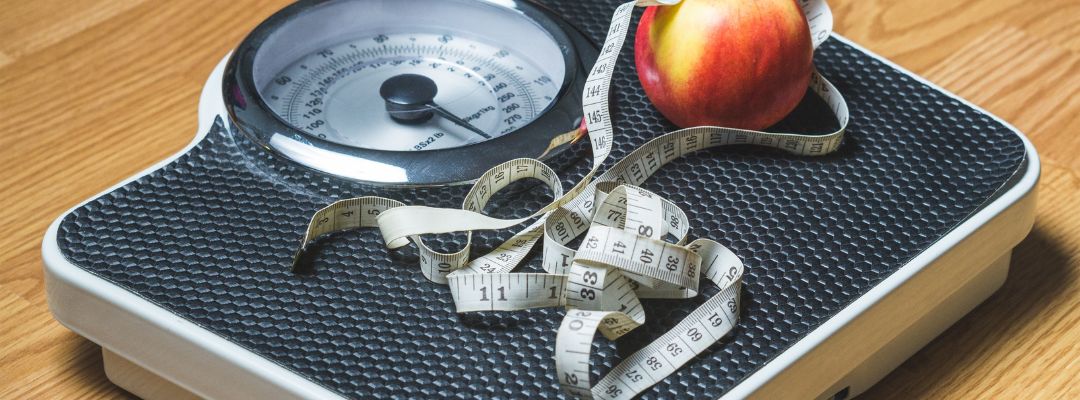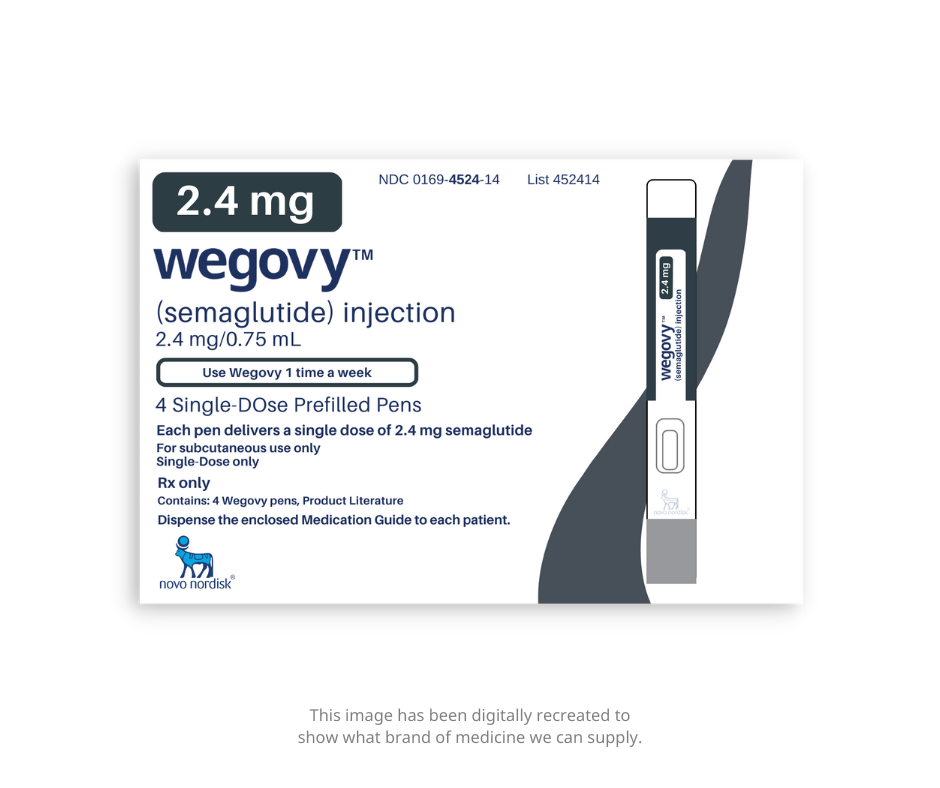Mounjaro is a new weight loss injection that can be prescribed if you meet certain BMI requirements. It is also used for people with type 2 diabetes who have high blood sugar (glucose) levels and contains the active ingredient tirzepatide. Mounjaro for weight loss comes as an injection pen that can be administered once a week to reduce food cravings, and promote feelings of fullness.
It should always be taken alongside a diet and exercise plan, no matter if you are taking it for weight loss or diabetes. You can only get Mounjaro on prescription. In the US, Mounjaro for weight loss is found under the brand name Zepbound. Mounjaro was only recently approved for weight loss in the UK (8 November 2023) and is available on a private prescription.
Mounjaro contains the active ingredient tirzepatide. It is the first medication that imitates 2 different hormones that can reduce food cravings, appetite, and blood sugar.
These hormones are:
- glucagon-like peptide-1 (GLP-1)
- glucose-dependent insulinotropic polypeptide (GIP)
Mounjaro increases the time it takes to empty your stomach, which makes it easier to feel fuller for longer, helping with weight loss. It also works on the parts of your brain that control appetite and hunger, making you feel fuller even while eating less.
Both GIP and GLP-1 also increase the production of insulin in your body. Insulin is essential for reducing and maintaining blood sugar levels. When injected, Mounjaro can help people with type 2 diabetes to control and manage high blood sugar levels. This is also helpful if you’re using Mounjaro for weight loss, as it can reduce blood sugar spikes. Unregulated blood sugar can also cause food cravings.
The effects on both blood sugar and appetite make it an effective weight loss drug, as it can reduce your calorie intake without craving food in between meals.
How long does it take for Mounjaro to work?
Mounjaro should start working immediately, but it may take several weeks to see the full effect of this medicine. This is because your Mounjaro dosage will be increased gradually to reduce side effects.
For weight loss, studies have found that in some cases people who used the largest dose of Mounjaro, 15mg, lost as much as 22.5% of their body weight. You’ll get the best effect from this medication when taking it alongside healthy lifestyle changes, such as eating a balanced diet, reducing snacking between meals, and exercising for 150 minutes a week.
To take Mounjaro for weight loss you should inject your dose once a week, on the same day and at the same time. This helps keep the levels of tirzepatide steady in your bloodstream, reducing the risk of side effects and increasing its effectiveness.
- We only stock Mounjaro as a multi-dose pen. This means that each Mounjaro pen contains 4 doses of the same strength. Make sure to follow your doctor's instructions and the patient information leaflet included with your pen.
- You should only inject Mounjaro (tirzepatide) into the skin of your belly or upper thighs, avoiding any veins or muscles. You can inject in the outer section of your upper arms if they have a substantial subcutaneous layer and you can get someone else to help you do so.
- You’ll need to use a new needle for each injection. Make sure you have a sharps bin nearby so you can safely dispose of it when you’re finished.
- Always check your pen and needle for signs of damage and do not use it if it’s unsealed or bent. You should also check the liquid for discolouration or cloudiness – in case it’s not clear and colourless to slightly yellowish, you may need to use a new pen.
- Before taking your dose, make sure that you’ve got the right medication and right dose according to the Mounjaro dosing schedule. This is especially important if you take other injectable medications like insulin.
Where should I inject Mounjaro?
Mounjaro should ideally be injected into your upper legs, or your stomach. If you choose to inject in your stomach, leave at least a 5cm gap from the belly button. As Mounjaro is only injected once a week, you aren’t likely to get too much soreness and irritation at the injection site. But to avoid this happening, choose a different site each week, even if this is just a different section of the skin in the same area.
Should I take Mounjaro with food?
You can take Mounjaro with or without food, as it’s not being taken by mouth. Find a routine that works for you.
When is the best time to take Mounjaro?
It doesn’t matter what time you take Mounjaro, it will still work until your next dose. It’s important that you take it at the same time and day each week. Choose a routine that works for you and use your calendar or an alarm to remind you when your next dose is due. You can also change your day and time of injection occasionally, but this shouldn’t happen too often.
Is Mounjaro used long term?
Mounjaro is safe as a long term treatment for both weight loss and type 2 diabetes. If you’re taking Mounjaro for weight loss, you’d usually take it until you’ve reached your weight loss goals. Your doctor may stop Mounjaro if your side effects are too strong or you aren’t losing weight as expected.
Mounjaro comes with a dosing schedule so that you can slowly increase your dose. This helps to reduce common side effects like nausea (feeling sick) and vomiting (being sick). No matter what dose you’re currently taking, you’ll only ever take 1 dose a week.
Mounjaro starts at a dose of 2.5mg per week for 4 weeks. You’ll then increase your dose to 5mg once a week for another 4 weeks. After this, your dose can be increased every 4 weeks until the maximum dose of 15mg. Your doctor will let you know when you can increase your dose. This will be determined by any side effects and how well the dose is working for you.
The following doses of Mounjaro pens are available:
- 2.5mg
- 5mg
- 7.5mg
- 10mg
- 12.5mg
- 15mg
This is how much tirzepatide is contained in each injection.
What is the starting dose of Mounjaro?
The starting dose of Mounjaro is always 2.5mg for 4 weeks. Even if you’re switching from another weight loss injection or have taken Mounjaro in the past, you’ll still start on this dose.
What is the recommended dose?
The most weight loss is seen once you reach the maximum dose of 15mg but this will depend on how your body responds to the medication and if you get any side effects.
Important: Never increase the dose higher than recommended by your doctor – this will increase the risk of strong side effects, severe illness, and might cause you to stop or pause your treatment, which will hinder your weight loss.
What if I miss a dose?
If you miss a dose of Mounjaro, what you do next will depend on how long it’s been since your last dose was due.
- If it’s been 4 days or less since your last dose was due, take it as soon as you remember. You can then continue treatment as normal on your usual day and time, even if this means taking 2 doses a few days apart.
- If it’s been longer than 4 days, skip the missed dose then continue treatment when your next dose is due.
Which factors can affect my dosage?
The factors that can affect your Mounjaro dosage may include:
- how long you’ve been taking the medication for
- whether you’ve gotten side effects
- your weight loss results on your current dosage
- how many doses have been missed, as you may need to stay on a lower dose for longer if you’ve missed doses
You’ll usually follow the Mounjaro dosing schedule, which means starting at a lower dose before increasing every 4 weeks.
Several studies were carried out to look into the effectiveness of Mounjaro as a weight loss treatment. The results of these studies were followed by the approval of Mounjaro in the UK for weight loss.
The SURMOUNT-1 clinical trial found that 85.1% of people taking tirzepatide once a week lost at least 5% of their initial body weight after taking it for 72 weeks. The higher the dose, the bigger the weight loss results, as seen below:
| Average weight loss (the percentage of weight lost compared to starting body weight) |
Weekly dosage of tirzepatide (Mounjaro) |
| 16% |
5mg |
| 21.4% |
10mg |
| 22.5% |
15mg |
| 2.4% |
Placebo |
Mounjaro vs Wegovy
Both Mounjaro and Wegovy have been found to be effective weight loss medications. Which one of them works best for you will depend on how your body reacts to the medication. You may only be suitable for one or find that one works better for you. They both work similarly, although Mounjaro is a dual agonist, so affects a larger range of hormones than Wegovy.
| |
Mounjaro |
Wegovy |
| Active ingredient |
Tirzepatide (GLP-1 and GIP receptor agonist) |
Semaglutide (GLP-1 agonist) |
| Recommended dose |
2.5mg to 15mg |
0.25mg to 2.4mg |
| Most common side effects |
nausea, vomiting, diarrhoea, constipation, abdominal pain/discomfort |
nausea, vomiting, constipation, abdominal pain/discomfort, fatigue, headache |
| Frequency |
Weekly |
Weekly |
| Approved for |
Weight loss and type 2 diabetes |
Weight loss |
| Does it require a prescription? |
Yes |
Yes |
| % of people who lost 5% or more of their initial body weight |
96.3% by week 72, on a dose of 15 mg a week |
83.5% by week 68, on the highest dose of 2.4 mg a week |
As you can see from the chart above, both Mounjaro and Wegovy have similar results from clinical trials. It’s difficult to compare both and say which is more effective, as both haven’t been tested for the same number of weeks and within the same study.
Whether you’re taking Mounjaro for weight loss or diabetes, it has some side effects, although not everybody will get them.
Very common side effects of Mounjaro include:
- diarrhoea
- feeling sick (nausea)
- vomiting (being sick)
- constipation
- low blood sugar (if taken alongside certain diabetes medications)
These side effects are not usually severe and are most likely to happen when you first start taking Mounjaro. Mounjaro is introduced gradually to reduce these side effects, allowing your body to adjust to the treatment. Very common side effects should improve within a few weeks, but speak to your doctor if they persist.
Mounjaro can also cause low blood sugar when used with other medicines for type 2 diabetes, such as insulin. Tell your doctor if you get symptoms of low blood sugar, which include shaking, sweating, dizziness, hunger, and an increased heart rate.
Common side effects of Mounjaro include:
- fast pulse
- mild to moderate allergic reaction, such as eczema, itching, or rash
- pain in the stomach
- constipation
- indigestion
- bloating
- gas and burping
- heartburn or reflux
- fatigue
- an increase in the levels of pancreatic enzymes, which will show up on a blood test
- itching, redness, or irritation at the injection site
- low blood pressure
- dizziness
- hair loss
Uncommon side effects of Mounjaro include:
- gallstones
- an increase in calcitonin (a hormone that helps to control calcium levels)
- weight loss
- injection site pain
- an inflamed pancreas (acute pancreatitis) – speak to your doctor straight away if you notice severe stomach and/or lower back pain that isn’t going away
- low blood sugar (when using Mounjaro alongside metformin)
There may be other side effects that Mounjaro can cause. For an up-to-date list of all side effects, please see your patient information leaflet.
Are there any long-term side effects?
Mounjaro is not known to cause any long-term side effects. If you do get any side effects, they will probably go away or get better within a few weeks or will stop when you stop taking the medicine.
Are there any serious side effects of Mounjaro?
Mounjaro, like other medications, can cause a serious allergic reaction (anaphylaxis). This is a medical emergency and you must call 999 or get to A&E straight away. Symptoms include:
- breathing difficulties
- throat, face and mouth swelling
- fainting
Mounjaro can also cause an inflamed pancreas, known as acute pancreatitis. It might also cause gastroparesis, or dangerously low blood sugars in overdose. These require urgent medical attention, so speak to your doctor or call 111 or 999 if you have intense and persistent stomach and back pain, or if you think you may have used too much.
How to manage the side effects of Mounjaro
To manage the side effects of Mounjaro, you can:
- take your treatment at the same time and day each week
- manage nausea symptoms by sipping cold water, avoiding greasy, heavy meals, and eating smaller meals more often
- make sure to eat enough fibre
- stay hydrated
- take anti-diarrhoea tablets if needed
- only take the dose prescribed to you and avoid increasing your dose unless your doctor tells you to
- let your doctor know if you have any side effects that bother you or aren’t going away on their own
- speak to your doctor if you take other medications that may interact with Mounjaro or cause side effects
You can take Mounjaro for weight loss if you have:
- a BMI of 30 kg/m2 or more (obese)
- a BMI of 27 kg/m2 or more (overweight) and a risk factor or weight-related health problem (such as high blood pressure)
You should not use Mounjaro if you are allergic to any of the ingredients in the injection, especially tirzepatide. Mounjaro is also unsuitable for anyone under the age of 18. If you are pregnant or breastfeeding, Mounjaro is not recommended.
Speak to your doctor before using Mounjaro if you have:
- a severe health condition that affects the emptying of your stomach, such as severe gastroparesis
- an eye condition, such as diabetic retinopathy
- ever had pancreatitis, which is an inflammation of the pancreas
Interactions with other medications
Mounjaro may interact with other medications, so speak to your doctor if you take any prescription or over-the-counter medications, or herbal remedies. You should also inform your doctor if you use another diabetic medication, especially insulin or sulphonylurea.
Interactions with food/drinks
No food or drink interacts with Mounjaro, but you may want to avoid excessive alcohol consumption. Alcohol can affect your blood sugar levels and weight and may make Mounjaro less effective.










